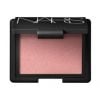Beauty Tips
8 Secrets Cosmetic Companies Don't Want You to KnowYou won't believe what these cosmetic chemists had to say about your beloved beauty products |
You're Paying for Packaging, Not Product The old saying, "Don't judge a book by its cover," applies here. "Like a house has curb appeal, a product has what's called 'shelf appeal,'" explains Sandy Alcide, a freelance cosmetic chemist and founder of her own organic skin care line, Motion Medica.
Because no woman wants to cover her face in something that looks like it was concocted in someone's basement, most consumers are willing to shell out a lot more for a product that looks fancy. But a pretty package doesn't mean the product will work any better.
"What's in the jar or bottle is more important, but people feel better about using a glass jar," says Alcide. Glass is more expensive than plastic, and the price gets passed along to the consumer.
Cosmetic chemist Don Frey, who has worked with beauty giants Avon, Proctor & Gamble and Jafra, agrees: "There's not necessarily a correlation in the price point of a product. If you're using Lancôme, go buy L'Oreal. It's so close to Lancôme -- the packaging is much more expensive, but understand that that's what you're paying for."
However, cosmetic companies dispute claims like these. Their position is that there are significant differences in formulas that affect performance, longevity of wear, etc., and that these more expensive Research and Development costs, as well as ingredients, are what affect product pricing.
But what about all those warnings about reusing plastic bottles? Doesn't that mean plastics contain ingredients that are bad for the products?
Not so, according to Alcide, who says that any plastic packaging used in skin care products is a high grade that's specifically used for cosmetics, so leeching of plastic into product isn't a concern.
SEE NEXT PAGE: Sometimes You Get More Than What You Paid For ...
Because no woman wants to cover her face in something that looks like it was concocted in someone's basement, most consumers are willing to shell out a lot more for a product that looks fancy. But a pretty package doesn't mean the product will work any better.
"What's in the jar or bottle is more important, but people feel better about using a glass jar," says Alcide. Glass is more expensive than plastic, and the price gets passed along to the consumer.
Cosmetic chemist Don Frey, who has worked with beauty giants Avon, Proctor & Gamble and Jafra, agrees: "There's not necessarily a correlation in the price point of a product. If you're using Lancôme, go buy L'Oreal. It's so close to Lancôme -- the packaging is much more expensive, but understand that that's what you're paying for."
However, cosmetic companies dispute claims like these. Their position is that there are significant differences in formulas that affect performance, longevity of wear, etc., and that these more expensive Research and Development costs, as well as ingredients, are what affect product pricing.
But what about all those warnings about reusing plastic bottles? Doesn't that mean plastics contain ingredients that are bad for the products?
Not so, according to Alcide, who says that any plastic packaging used in skin care products is a high grade that's specifically used for cosmetics, so leeching of plastic into product isn't a concern.
SEE NEXT PAGE: Sometimes You Get More Than What You Paid For ...



























